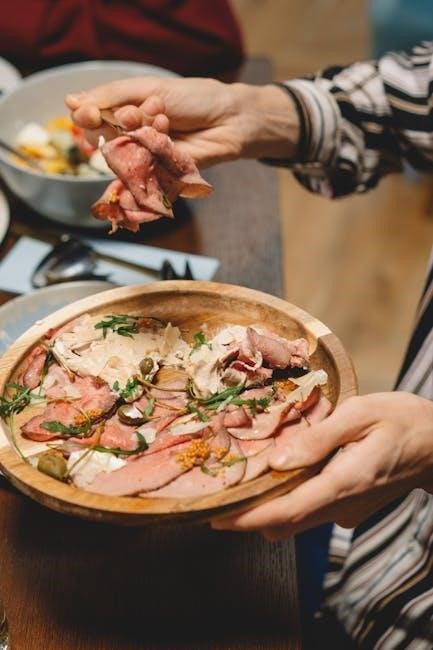
-
By:
- ruby
- No comment
who cooked the last supper pdf
Overview of the Book “Who Cooked the Last Supper?” by Rosalind Miles
Rosalind Miles’ book challenges traditional historical narratives, uncovering women’s hidden roles in pivotal events like the Last Supper, using historical evidence to reclaim their contributions.
1.1 The Historical Context and Purpose of the Book
Rosalind Miles’ “Who Cooked the Last Supper?” challenges the phallocentric bias in historical narratives, emphasizing women’s overlooked contributions. The book reexamines biblical and historical accounts, questioning the exclusion of women from pivotal events like the Last Supper. By blending scholarly research with feminist critique, Miles aims to reclaim women’s agency, showcasing their integral roles in shaping human history. Her work critiques traditional male-dominated narratives, offering a fresh perspective that highlights the often-erased female presence in religious and cultural contexts.
1.2 The Role of Women in the Last Supper and Beyond
Rosalind Miles highlights the often-overlooked roles of women in the Last Supper and its broader historical context. While traditional accounts focus on Jesus and his male disciples, Miles suggests that women like Mary, Martha, and others played crucial roles in preparing the meal and supporting the community. Their contributions, though unseen in biblical narratives, were essential to the functioning of Jesus’ mission. Miles emphasizes how women’s domestic and communal efforts were vital, yet systematically marginalized in historical and religious accounts, reflecting a broader pattern of female agency being erased from history.
1.3 The Author’s Approach to Reclaiming Women’s History
Rosalind Miles employs a meticulous, evidence-based approach to uncover women’s hidden contributions throughout history. By examining biblical texts, historical documents, and scholarly interpretations, she reconstructs the lives of women often omitted from traditional narratives. Miles challenges phallocentric biases in historical accounts, offering a fresh perspective that highlights women’s agency and influence. Her narrative style blends rigorous research with accessible storytelling, making complex historical insights engaging for a broad audience. This approach not only sheds light on women’s roles but also encourages readers to rethink their understanding of history and gender dynamics.

The Biblical Account of the Last Supper
The Last Supper was Jesus’ final meal with his twelve apostles before his crucifixion, commemorated in the Gospels of Matthew, Mark, and Luke, each offering distinct details.
2.1 The Gospels’ Versions of the Last Supper
The Gospels of Matthew, Mark, and Luke provide varying accounts of the Last Supper, differing in details such as the time, location, and specific events. Matthew focuses on Jesus’ announcement of betrayal, while Mark emphasizes the Passover context. Luke highlights Jesus’ words on service and the institution of the Eucharist. These differences reflect the unique theological and narrative purposes of each Gospel, yet all agree on the meal’s significance as Jesus’ final act before his arrest and crucifixion.
2.2 The Significance of the Meal in Christian Tradition
The Last Supper holds profound significance in Christian tradition, marking the institution of the Eucharist and symbolizing Jesus’ sacrifice. It is remembered as a sacred meal where Jesus shared bread and wine, representing his body and blood, to establish a covenant with his followers. This act is central to Christian rituals, commemorated in Communion, and is seen as a unifying force among believers. The meal also embodies Jesus’ final act of love and service before his crucifixion, reinforcing themes of redemption, forgiveness, and eternal life. Its enduring symbolic and spiritual importance remains unparalleled in Christian faith.

2.3 The Absence of Women in Traditional Narratives
Traditional accounts of the Last Supper, as depicted in Christian scripture and art, often exclude women, despite their significant roles in Jesus’ life and ministry. The Gospels focus primarily on the male disciples, overshadowing the contributions of women like Mary Magdalene and Jesus’ mother. This omission reflects broader cultural and religious biases that have historically marginalized women’s roles in sacred narratives. The absence of women in these stories has perpetuated a patriarchal view of religious history, overlooking their influence and agency in pivotal events. Rosalind Miles’ work challenges this oversight, shedding light on their forgotten presence.

The Title’s Provocative Question: “Who Cooked the Last Supper?”
The title challenges traditional narratives by highlighting women’s invisible roles, prompting readers to rethink their absence in historical accounts of the Last Supper.
3.1 Challenging Traditional Views of History
Rosalind Miles’ provocative question challenges the male-dominated narratives of history, urging readers to reconsider women’s roles in pivotal events like the Last Supper. By emphasizing the absence of women in traditional accounts, Miles highlights the phallocentric bias that has obscured their contributions. Her approach encourages a reexamination of historical records, inviting readers to question why women’s involvement has been marginalized. The book serves as a call to rewrite history from a more inclusive perspective, one that acknowledges the often-overlooked agency of women in shaping significant events.
3.2 The Phallocentric Bias in Historical Accounts
Miles identifies a profound phallocentric bias in historical narratives, where male experiences and perspectives dominate, marginalizing women’s roles. This bias, deeply rooted in patriarchal societies, has led to the erasure of women’s contributions from records of significant events, including the Last Supper. By questioning this imbalance, Miles reveals how such biases distort our understanding of history, perpetuating the invisibility of women’s agency and influence. Her analysis underscores the need for a more inclusive historical framework that recognizes and values women’s participation in shaping human history.

Reclaiming Women’s Roles in the Bible and History
Rosalind Miles challenges conventional narratives by uncovering women’s vital contributions, often overlooked in religious and historical accounts. She uses evidence to highlight their influence and agency.
4.1 The Contributions of Women in the Life of Jesus
Rosalind Miles emphasizes the often-overlooked roles of women in Jesus’ life, including their support and participation in his ministry. These women provided financial backing, emotional support, and were present at key events such as the crucifixion and resurrection. Miles argues that their contributions were essential to Jesus’ mission, yet they have been marginalized in traditional religious narratives. By highlighting their involvement, she seeks to restore their rightful place in Christian history. This challenges the male-dominated perspective that has historically defined biblical storytelling.
4.2 The Erasure of Women’s Agency in Historical Records
Rosalind Miles highlights how women’s roles in history have been systematically omitted or marginalized, particularly in religious narratives. Despite their active participation in events like the Last Supper, women’s contributions were often overshadowed by male-centric accounts. This erasure reflects a broader patriarchal bias in historical documentation, which has led to a skewed understanding of women’s agency. Miles challenges this exclusion by reexamining biblical and historical sources, offering a more inclusive perspective that acknowledges women’s influence and challenges the dominant male-focused narratives that have shaped traditional history.

Discussion Questions for “Who Cooked the Last Supper?”
What does the title imply about women’s roles in history? How does Miles challenge traditional narratives? What evidence supports her claims? How does this reshape your understanding of religious history?
5.1 Exploring the Book’s Themes and Arguments
Rosalind Miles’ “Who Cooked the Last Supper?” delves into themes of gender invisibility and historical exclusion. She argues that women’s contributions have been systematically erased from narratives like the Last Supper. Miles posits that by reclaiming these roles, we gain a more accurate understanding of history. Her approach challenges readers to question traditional accounts and consider the untold stories of women who shaped pivotal events. This exploration encourages a deeper reflection on how gender biases have influenced historical records and religious traditions.
5.2 Encouraging Deeper Reflection on Gender Roles
Rosalind Miles’ work prompts readers to critically examine gender roles in history and religion. By highlighting women’s invisible labor, Miles challenges the male-centric narratives that dominate traditional accounts. Her exploration of women’s contributions encourages readers to question how gender biases have shaped historical records. This reflection fosters a broader understanding of how societal roles are constructed and perpetuated. The book invites both secular and religious audiences to reconsider the significance of women’s agency in shaping cultural and spiritual traditions, ultimately advocating for a more inclusive view of history.

The Cultural and Religious Impact of the Book
Rosalind Miles’ work challenges traditional religious narratives, sparking debates among scholars and religious communities. It significantly contributes to feminist theology, reshaping perceptions of women’s roles in sacred history.
6.1 Reactions from Scholars and Religious Communities
Rosalind Miles’ book has sparked significant debate among scholars and religious communities. Many scholars praise her feminist perspective and the use of historical evidence to challenge traditional narratives. However, some critics argue that her reinterpretation of biblical events lacks sufficient textual support. Religious communities have been particularly divided, with some embracing the book as a refreshing critique of patriarchal interpretations, while others view it as a disruptive challenge to deeply held beliefs. The book’s popularity and translation into multiple languages underscore its cultural and religious impact.
6.2 The Book’s Contribution to Feminist Theology
Rosalind Miles’ work significantly contributes to feminist theology by highlighting women’s pivotal roles in biblical narratives, often overlooked in traditional interpretations. The book challenges phallocentric views, offering a fresh perspective on women’s agency in religious history. By examining their contributions, Miles provides a theological framework that validates women’s experiences and spirituality. This approach has been particularly influential in redefining how religious communities perceive gender roles, encouraging a more inclusive understanding of sacred texts and historical events. Her work remains a cornerstone in feminist theological discourse, inspiring further exploration of women’s divine roles.
Rosalind Miles’ book challenges traditional narratives, emphasizing women’s essential roles in history and religion. Her work advocates for a feminist reinterpretation of sacred events, inspiring a broader understanding of gender’s impact on historical accounts and theological discussions.
7.1 The Importance of Revisiting History Through a Feminist Lens
Rosalind Miles’ work underscores the necessity of reevaluating historical narratives through a feminist perspective to uncover women’s overlooked contributions. By challenging patriarchal interpretations, the book reveals how women’s roles have been marginalized in religious and historical accounts. Miles’ approach not only highlights the importance of inclusivity but also bridges the gap between theology and feminist scholarship, offering a more balanced understanding of history. This lens encourages readers to question traditional views and advocate for gender equality in historical education and interpretation.
7.2 The Legacy of Rosalind Miles’ Work
Rosalind Miles’ “Who Cooked the Last Supper?” has left a lasting impact on feminist theology and historical scholarship. By challenging patriarchal narratives, her work has inspired a broader recognition of women’s contributions to history and religion. Miles’ approach has not only influenced academic discourse but also sparked public interest in revisiting gender roles in biblical and historical contexts. Her legacy lies in empowering future generations to question traditional accounts and seek a more inclusive understanding of the past, ensuring women’s voices are no longer overlooked in historical storytelling.